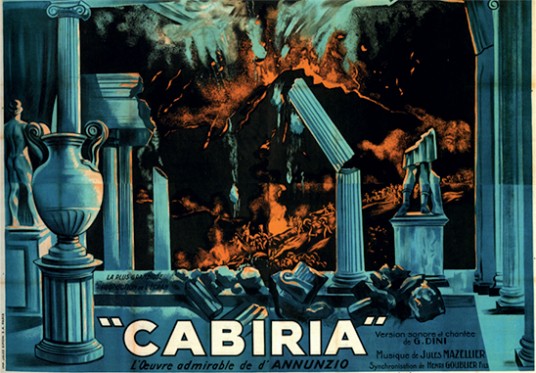Maria Wyke – Ancient Rome in Silent Cinema

In recent years, Hollywood has released a number of big-budget films set in antiquity, from Gladiator (2000) to Pompeii (2014). Yet cinema has been fascinated with the ancient world—and with Roman history in particular—since it emerged as a new technology more than one hundred years ago. The persistent presence of ancient Rome in early cinema compels us to ask: why did so modern a medium have so strong an interest in antiquity right from its start? What did ancient Rome do for cinema? And what did cinema do for ancient Rome?
Maria Wyke, a noted scholar of Latin literature, will address these questions and more in the 2015 Jerome Lectures, The Ancient World in Silent Cinema. In the 43rd year of the Lecture series, this year will include three lectures, with introductions by Alessandro Schiesaro (La Sapienza Università di Roma) and Alessandra Capodiferro (SS-Col, Museo Nazionale Romano di Palazzo Altemps) and, for the first time, a screening of the silent film, The Last Days of Pompeii (1913), with intertitles in English and Italian and live piano accompaniment by Stefano Maccagno.
The first lecture will set the scene for more detailed discussion of the three national film industries that reconstructed their own versions of ancient Rome on screen from the 1890s through the arrival of sound in the 1920s—France, Italy, and the United States. Subjects addressed will include the relationship of early cinema’s Rome with the Rome of other nineteenth-century arts, both high (theatre, opera, dance, painting, the novel) and popular (circus shows, pyrodramas, puppetry and magic acts); the development of cinematic technologies for the reconstruction of Roman history; the use of Rome on film to stimulate a collective national and imperial consciousness; and the cinematic reconstruction of the Roman past to explore—and challenge—modern concerns about religion, politics, ethics, class, gender and sexuality, as well as the new medium itself.
All events are free and open to the public. All lectures will be given in English.
About Maria Wyke, 2015 Jerome Lecturer
Maria Wyke is Professor of Latin at University College London. She has written extensively on Roman love poetry and ancient gender and sexuality, on the reception of Julius Caesar in Western culture (Caesar: A Life in Western Culture, 2007; Caesar in the USA, 2012), and on ancient Rome in cinema (Projecting the Past: Ancient Rome, Cinema and History, 1997; ed., with P. Michelakis, The Ancient World in Silent Cinema, 2013). Most recently she has co-authored with Christopher Pelling a short work that explores why classical literature still has relevance today, Twelve Voices from Greece and Rome: Ancient Ideas for Modern Times (2014).
About the Jerome Lectures
Thomas Spencer Jerome (1864-1914) was an American lawyer and lover of Roman history who lived on Capri from 1899 until his death. In his will he endowed a series of lectures to be jointly administered by the University of Michigan and the American Academy in Rome, and delivered at both institutions. The Jerome Lectures have become one of the most prestigious international lecture series for the presentation of new work on Roman history and culture. The revised lectures are typically published by the University of Michigan Press.
Monday, 13 April 2015
6pm, AAR Lecture Room
Lecture I
Introduction, Alessandro Schiesaro (La Sapienza Università di Roma)
France 1890s to 1910s: experimentation and aesthetics
Wednesday, 15 April 2015
5:30pm, Museo Nazionale Romano di Palazzo Altemps
Via di Sant'Apollinare, 8
Lecture II - Film Screening
Introduction, Alessandra Capodiferro (SS-Col, Museo Nazionale Romano di Palazzo Altemps)
a screening of the silent film, The Last Days of Pompeii (1913), with intertitles in English and Italian and live piano accompaniment by Stefano Maccagno.
Friday, 17 April 2015
6pm, AAR Lecture Room
Lecture III
Italy 1910s: national consciousness
Monday, 20 April 2015
6pm, AAR Lecture Room
Lecture IV
America 1910s to 1920s: morality and subversion
In collaboration with the Soprintendenza Speciale per il Colosseo, il Museo Nazionale Romano e l’Area
archeologica di Roma - Museo Nazionale Romano di Palazzo Altemps.